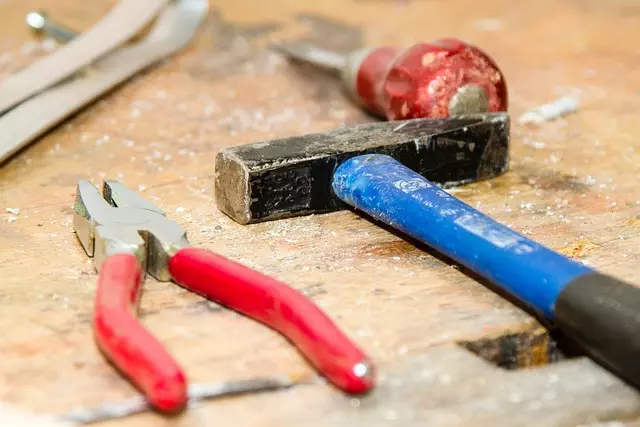Heavy-duty concrete anchor bolts are vital for Foundation Repair with Warranty, offering superior strength and structural integrity. Different types cater to specific needs, from expansion bolts for movement to threaded rods for seamless integration. Installation requires meticulous cleaning, drilling, insertion, torque securing, alignment checks, sealing, and regular maintenance. High-quality, premium bolts engineered for durability and corrosion resistance are key, ensuring long-term reliability backed by warranty protection. Selection should focus on length, size, material composition (high-strength steel), and specific concrete types for optimal performance in demanding environments. Regular maintenance extends bolt lifespan, preventing damage and costly future repairs.
Heavy-duty concrete anchor bolts are essential components in foundation repair, offering secure anchoring for a range of structural applications. This comprehensive guide delves into the world of these robust fasteners, exploring their critical role in reinforcing concrete structures. From understanding their types and installation processes to choosing the right specifications and addressing common challenges, we provide insights to ensure successful foundation repairs with a focus on quality anchor bolts backed by warranty.
Understanding Heavy-Duty Concrete Anchor Bolts: Their Role in Foundation Repair

Heavy-duty concrete anchor bolts are specialized hardware designed for foundation repair and structural enhancement, offering a robust solution for securing objects to concrete surfaces. These bolts play a pivotal role in various construction and renovation projects, ensuring stability and longevity. When it comes to foundation repair with a warranty, these anchor bolts are often the backbone of successful restoration efforts.
By providing an incredibly strong connection between the bolt and the concrete, they create a reliable anchor for a range of applications. This includes securing heavy equipment, reinforcing structural elements, and stabilizing cracks or uneven surfaces. With their superior strength and durability, heavy-duty concrete anchor bolts provide peace of mind, ensuring that structures remain intact and safe over time.
Types of Anchor Bolts for Diverse Foundation Needs

When it comes to foundation repair, choosing the right anchor bolts is essential for ensuring structural integrity and long-lasting results. Anchor bolts are designed to secure heavy objects or structures to concrete foundations, and they come in various types tailored to meet diverse foundation needs. For example, expansion bolts are ideal for situations where there’s a need to accommodate potential future movement of the foundation due to soil conditions or temperature changes. These bolts expand into the concrete as they set, creating a strong, permanent hold.
Another type is the sleeve anchor bolt, which involves inserting a metal sleeve into a predrilled hole and then threading the bolt through it. This method offers enhanced holding power and allows for easy removal if necessary, making it suitable for temporary or adjustable mounting applications. For situations requiring an invisible, seamless integration with existing concrete, threaded rods can be used as anchor bolts. These rods are embedded directly into the concrete during installation, providing a discreet yet robust solution for supporting heavy loads without compromising the foundation’s aesthetics. Foundation repair with warranty often benefits from these specialized anchor bolt types, ensuring stability and durability for years to come.
Installation Process: Ensuring Secure and Lasting Foundations

The installation process of heavy-duty concrete anchor bolts is a critical step in ensuring secure and lasting foundations for any construction project. It involves several precise steps to guarantee that the bolts are correctly positioned, tightened, and aligned. First, prepare the surface by cleaning it thoroughly, removing any debris or contaminants that could hinder adhesion. Next, drill pilot holes into the concrete at the desired locations, following manufacturer guidelines for depth and diameter. Inserting the anchor bolts is a meticulous task; use the appropriate tools to ensure they fit snugly within the holes. Once in place, apply the correct torque to secure them firmly, often requiring heavy-duty equipment for larger projects. This step is crucial for Foundation Repair with Warranty, as it provides the necessary strength and stability for any subsequent structural work.
Proper installation also involves checking the bolts’ alignment and ensuring they are evenly spaced to distribute weight effectively. After verification, seal the anchor bolt heads with approved sealants or covers to protect them from corrosion and environmental damage. Regular maintenance checks and re-inspection at intervals recommended by structural engineers are essential to ensure these foundations remain robust over time.
Advantages of Using Quality Anchor Bolts with Warranty

Using high-quality anchor bolts with a warranty offers significant advantages for foundation repair projects. These top-tier products are designed to withstand intense pressure and stress, ensuring structural integrity and longevity. They are crafted from premium materials, guaranteeing their durability and resistance to corrosion, which is essential for underground installations.
A warranty provides peace of mind, assuring customers that their investment is protected. It offers a safety net against potential failures, allowing them to focus on the repair process without worrying about unexpected costs or structural damage. With a reliable warranty in place, foundation repair services can be undertaken with confidence, knowing that the anchor bolts will perform as expected and contribute to a successful and long-lasting solution.
Choosing the Right Length, Size, and Material for Optimal Performance

When selecting heavy-duty concrete anchor bolts for foundation repair projects, choosing the right specifications is paramount for optimal performance and long-lasting results. The length, size, and material composition significantly impact the bolt’s strength and durability. For instance, longer bolts provide more reach and versatility in deep concrete structures, while shorter ones are ideal for shallow applications where space is limited. Similarly, selecting the appropriate size ensures a secure fit within the concrete, allowing for maximum load-bearing capacity.
Material choice is another critical factor. High-strength steel bolts offer superior resistance to intense loads and corrosion, making them suitable for demanding foundation repair with warranty requirements. Ensuring the material meets industry standards guarantees the bolt’s integrity over time, providing reliable support for various construction and structural stabilization projects.
Common Challenges in Concrete Anchor Bolt Installation and Solutions

Concrete anchor bolt installation can present several challenges, especially in demanding construction and industrial settings. One common issue is achieving proper anchoring depth, as shallow bolts may fail to provide adequate strength for heavy loads. This problem can be addressed by using specialized drilling equipment that allows for precise control over bolt placement and depth, ensuring a solid foundation for subsequent structures or machinery.
Another challenge is concrete hardness and variability, which can affect bolt embedment and load-bearing capacity. To overcome this, it’s crucial to select anchor bolts suitable for the specific concrete type and condition. Additionally, pre-drilling pilot holes can prevent the concrete from cracking during installation, enhancing the overall stability of the foundation repair with warranty. This meticulous approach guarantees a robust and reliable anchoring system.
Maintenance Tips to Prolong the Lifespan of Your Foundation Repair

Proper maintenance is key to prolonging the lifespan of your foundation repair, ensuring stability and structural integrity for years to come. Regularly inspect the area around your concrete anchor bolts for any signs of damage, corrosion, or loose connections. Addressing these issues promptly can prevent more serious problems down the line.
Consider implementing a preventive maintenance routine that includes cleaning the bolts and surrounding areas with mild detergent and water to remove dirt and debris. Apply a protective coating or sealant to guard against moisture intrusion and corrosion. Additionally, check for proper tension in the bolts and adjust as needed, following the manufacturer’s guidelines. Remember, maintaining your foundation repair is an ongoing process that requires dedication but will ultimately save you from costly repairs in the future, especially when backed by a reliable Foundation Repair with Warranty.
